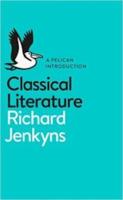
Pelican (2015) p/b 332pp £7.99 (ISBN 9780141977355)
English style and fearless value-judgements make this an exhilarating read. A general picture needs light and shade, and these are plentifully provided: ‘Much of what the ancients wrote was never meant to be more than useful, and among more ambitious works the quality varies greatly.’
J. assumes that ancient authors knew what they were doing. Homer (or at least the ‘single mind’ behind each epic) was master not servant of the oral tradition he inherited. Roman poets were not constricted by rules of generic composition. Virgil plays with the conceits of Callimachus in the Eclogues, but ‘bats him aside’ in the Georgics. ‘Silver Latin’, laboriously rehabilitated in recent decades, here seems scarcely to deserve even that name.
The perspective is very traditional, yet (as J. himself says of Lucretius) ‘a familiar sight becomes strange and wonderful’. Attention is repeatedly drawn to close observation, to effects of sound and metre, to unexpected connections. Descriptions of landscape (Aeneas sailing up the Tiber, Martial on the topography of Rome) are often a litmus. Conversely ‘rather unimaginative’ treatment of nature in Ovid’s Metamorphoses is (along with limited variety of style and tone) part of reason why the now much admired poem ‘can be overrated’.
‘Restraint’ is admired. J. often cites Victorian poets and critics (Tennyson, Browning, Matthew Arnold), and behind them ‘the anonymous author usually known as Longinus’. Indeed he shares their perspective. Epigrammatic wit worthy of the disparaged Silver Latin overlies deep seriousness. Homeric formulae give a ‘sense of the world’s goodness’, yet the Iliad ends ‘on the brink of hell’. The Aeneid has a ‘theme of world-historical importance’. Literature more about literature than about life was ‘a trap into which some Roman writers, and rather more modern scholars, were to fall’.
J. is probably at his best on the authors he ranks highest: Homer, Aeschylus and Virgil. But he is outstanding too on Sophocles (Oedipus accomplishing his doom by trying to avoid it, as in the ‘appointment at Samarra’), on Lucretius (‘passionate reticence’), and on Juvenal (‘the most satiric of poets, but the most poetic of satirists too’). The six pages on the literary qualities of the New Testament should be required reading for students of theology. Readers may not always agree with J., but he reminds us why the Oxford classics course has traditionally been called ‘Greats’.
John Taylor—University of Manchester
